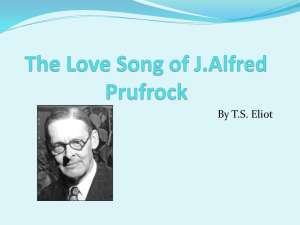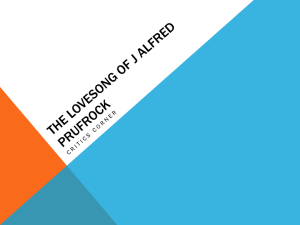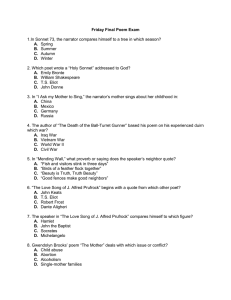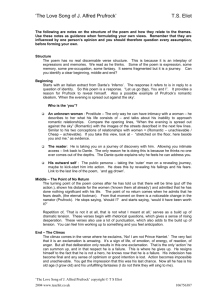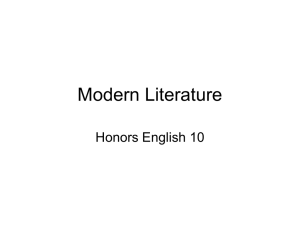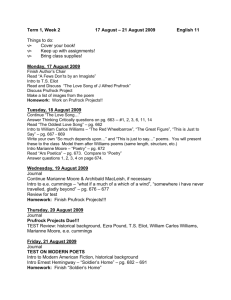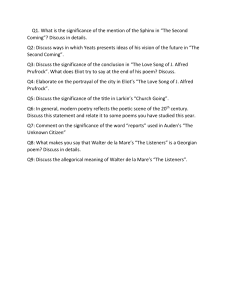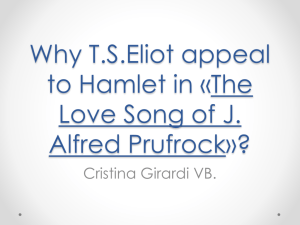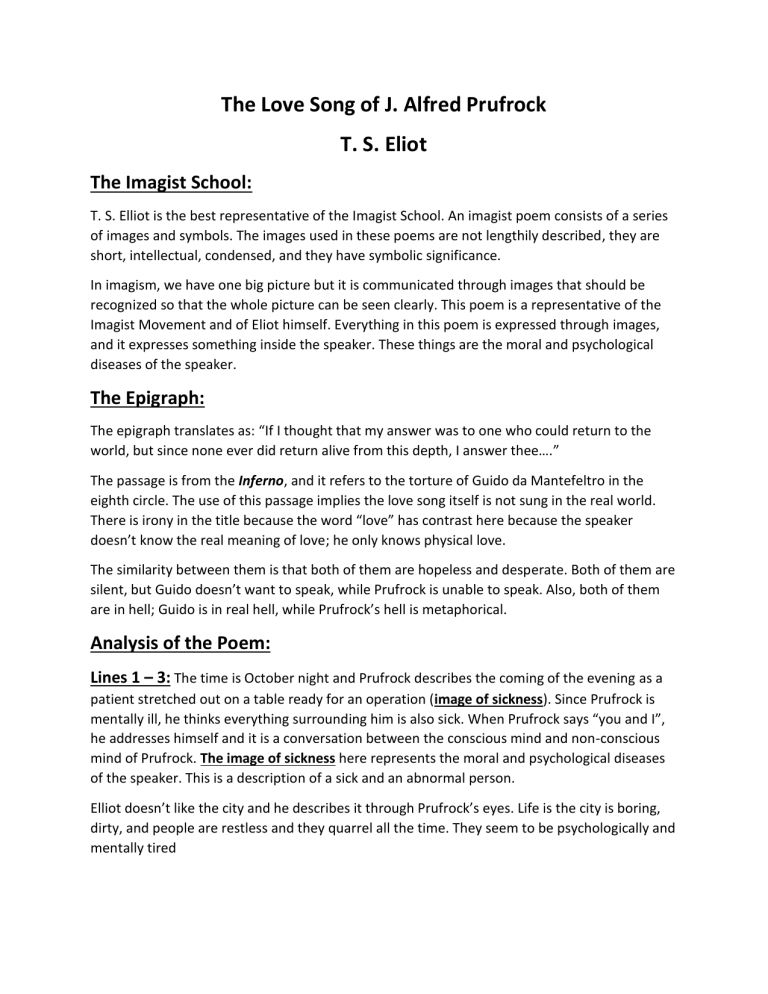
The Love Song of J. Alfred Prufrock
T. S. Eliot
The Imagist School:
T. S. Elliot is the best representative of the Imagist School. An imagist poem consists of a series of images and symbols. The images used in these poems are not lengthily described, they are short, intellectual, condensed, and they have symbolic significance.
In imagism, we have one big picture but it is communicated through images that should be recognized so that the whole picture can be seen clearly. This poem is a representative of the
Imagist Movement and of Eliot himself. Everything in this poem is expressed through images, and it expresses something inside the speaker. These things are the moral and psychological diseases of the speaker.
The Epigraph:
The epigraph translates as: “If I thought that my answer was to one who could return to the world, but since none ever did return alive from this depth, I answer thee….”
The passage is from the Inferno, and it refers to the torture of Guido da Mantefeltro in the eighth circle. The use of this passage implies the love song itself is not sung in the real world.
There is irony in the title because the word “love” has contrast here because the speaker doesn’t know the real meaning of love; he only knows physical love.
The similarity between them is that both of them are hopeless and desperate. Both of them are silent, but Guido doesn’t want to speak, while Prufrock is unable to speak. Also, both of them are in hell; Guido is in real hell, while Prufrock’s hell is metaphorical.
Analysis of the Poem:
Lines 1 – 3:
The time is October night and Prufrock describes the coming of the evening as a patient stretched out on a table ready for an operation (image of sickness). Since Prufrock is mentally ill, he thinks everything surrounding him is also sick. When Prufrock says “you and I”, he addresses himself and it is a conversation between the conscious mind and non-conscious mind of Prufrock. The image of sickness here represents the moral and psychological diseases of the speaker. This is a description of a sick and an abnormal person.
Elliot doesn’t like the city and he describes it through Prufrock’s eyes. Life is the city is boring, dirty, and people are restless and they quarrel all the time. They seem to be psychologically and mentally tired
Lines 4 – 6:
Usually on winter nights the streets are empty and cold, while the subways
(retreats) are full of people, noisy (muttering), and full of shops and dirty restaurants. The hotels are cheap and their services are bad. These images of (cold, empty, long, dirty) streets and retreats represent Prufrock’s life and soul. His life is cold and empty because he is alone.
The two images of the wide streets and the narrow retreats show us the two faces of Prufrock; the public face, and the private face. There is a contrast between his appearance and reality. He has one clear side and another hidden, or dark side because he lives in conflict. On the outside, he is clear like the empty streets, but on the inside he is dirty, dark and noisy like the retreats.
He describes the city with dirt images such as “soot” and “chimneys” to suggest that the city is polluted and dirty.
The yellow fog is an image of sickness and confusion. The psychological conflict inside Prufrock begins to increase here. He loses control over his language. The word “fog” reflects his confusion, and the color “yellow” reflects his moral sickness. Prufrock doesn’t look at love as something healthy, romantic or spiritual because he is dirty and dark on the inside.
Lines 7 – 9:
Animal imagery is so important in this poem as it expresses Prufrock’s physical desire. Prufrock always mentions animals, especially small ones because he looks at love from a physical point of view. So, he makes a comparison subconsciously between himself and animals that keep drawing his attention. For example, oyster is connected with instinct and physicality and it reflects Prufrock’s physical desire.
The word “sawdust” here is an image of dirt. The speaker suggests that the streets are dirty of the sawdust and oyster shells, and this reflects Prufrock’s dirty way of thinking as he can only think of physical pleasures. Oyster is the first animal mentioned in this poem (which is an image of lust) and it reflects Prufrock’s animalistic way of thinking. He thinks only of physical love, like an animal. The shell is an image of suppression and cowardice, and all these images (oyster and shells) represent Prufrock’s psychological insight.
The streets seem long and endless like a boring discussion. The discussion will be boring when we have a hidden intention and secrets that we don’t want to reveal.
Lines 10 – 12:
The poet says that he has two reasons to go to that party, one is because he has been invited as a guest, and the other reason is a hidden intention that he doesn’t want to reveal. He doesn’t want to ask himself also (Do not ask), because he is afraid of the answer, or he is afraid that his inner intention is going to be revealed.
Lines 13 – 14:
The setting is going to change here because Prufrock reached the party and the first thing that draws his attention is the women (physical love). The line is a refrain and it serves as an allusion. Michelangelo is a nudist painter/genius. Women in the party also have physical tendencies. The repetition shows how life of the upper class and Prufrock’s life is so rapid and monotonous. The movement of the women here expresses the monotony of the
aristocracy’s life. They are interested in art because they are talking of Michelangelo who is a nudist artist (painting naked bodies). People of the upper class only care about their desires, just like Prufrock.
When Prufrock is invited to the party he begins thinking of physical love because he knows that he would find it there. The environment is suitable for that. The aristocracy’s way of living is unchangeable and they do the same things all the time (talking, drinking tea, eating cake, looking for physical pleasure).
The allusions in T. S. Eliot shows the contrast between the past and present. Eliot’s style is allusive, using allusions to refer to something outside the text to make a point.
Allusion of Michelangelo:
Michelangelo was the pride of the Renaissance. He was known as a nudist, painting naked bodies. The allusion of Michelangelo shows the contrast between the past and present, between the 16 th century and the 20 th century. In the past, there were people like Michelangelo who are interested in culture and art. In the present, there are people like Prufrock who are interested in physical love. Michelangelo serves as a contrast to Prufrock.
The women are talking about the painting of Michelangelo means that these women are interested in physical love. They also represent the aristocracy. There is no similarity between
Michelangelo and Prufrock as Michelangelo is the opposite of him.
Line 15:
The poet uses the yellow color to describe the fog. The yellow color refers to sickness and disease (image of sickness), and the yellow fog here is referring to Prufrock’s mental sickness, which is another image of sickness.
The poet describes the fog like an animal (a cat) and this is the second image of an animal, which is an image of physical love. The relationship between Prufrock and the animals show that both Prufrock and these animals belong in the same world of physical desire. Prufrock describes the fog like a cat rubbing its back against the window panes. The language here is metaphorical, Prufrock describes the fog metaphorically like a cat. The cat as an animal does not stand for lust only, but also for cowardice and suppression. It reflects his weakness and physical desire at the same time. The fog represents confusion, and the window panes or edges represents cells.
Line 16:
Now Prufrock is confused (image of fog) so he doesn’t control his language and says
“smoke” instead of “fog” and “muzzle” instead of “mouth” and these are images of confusion.
Line 17:
The cat licks the edges and the corners of the evening (image of physical love) which means the fog is covering everything gradually like a cat licking the edges of its plate after finishing its food.
Line 18 – 19:
The image of the cat lingering near the drain water is an image of dirt. The poet suggests that the cat is a dirty animal because it stays near the dirty places and allows soot to cover its back. This is an image of lust and dirt.
Lines 20 – 22:
Then he describes the evening as a cat after eating its meal, it curls itself and sleeps by the balcony. The word “curl” is an image of suppression. The poet uses words as
“shell and curl” to portray suppression, and he also uses animals like cat and oyster to refer to physical love. This suggests that Prufrock is only interested in physical love and he feels himself suppressed in his life.
Lines 23 – 27: The sentence “There will be time” is repeated several times to emphasize
Prufrock’s hesitation when he assures himself that he still has the time to think and not to take actions (like Hamlet).
The phrase “to prepare a face” suggests that each man has two faces; one is public which he uses to meet others, and one is his real face that he tries to discover. This line carries hypocrisy and criticism to the upper class suggesting that the upper class people have two faces. Prufrock also has a duality, or two faces for no one is honest and direct. So he uses one face as a guest being invited to the party, while the other face, which he tries to hide, shows his real personality and reveals his physical desires which he doesn’t dare express publicly.
Allusions to Hamlet:
Prufrock compares himself to Hamlet. He starts looking for excuses to cover up his weakness and his inability to express himself. One of these excuses is to keep delaying his decision by saying that he has enough time since the party is still at its beginning.
Hamlet delays his decision because he doesn’t have strong reasons, but then he makes his decision at the end of the play. So, both Prufrock and hamlet hesitate in taking their decision, both of them are indecisive. But the difference is that Hamlet is a man of action, while Prufrock is a man of words and dreams. He thinks without doing anything.
At the end of the poem, Prufrock discovers that he is not like Hamlet because he doesn’t do anything at the end. He loses control over his language and doesn’t know what to say or how to express himself. So he concludes that Hamlet is brave, wise, and his delay is taking a decision is justifiable. When Prufrock makes this comparison he discovers that it is impossible because he can’t take a decision like Hamlet.
Line 28 – 29:
Prufrock insists on the idea that he still has time to think and not to take action.
He seems to be a man of words rather than a man of actions by saying ironically that he is like the people who call for revolutions and need to wait and plan very well before taking the action. These lines are from the Greek poet Hesiod, for Prufrock to express his love is as difficult as preparing for a revolution. But in reality he is a coward and even if he had a suitable time, he would not be serious.
The reference to Hesiod’s poem “Works and Days” represents an allusion in which Elliot shows the contrast between the past and the present. For modern man, even the smallest problem seems really big, and this is different from the past.
Lines 30 – 34:
Prufrock decides that the best time to start expressing his love is while people are eating and drinking. This is another criticism of the upper class society as he suggests that rich people only think of parties, eating, drinking, and having physical pleasures. Prufrock says that he still has time for not taking actions (indecisions) and for thinking (visions) and for rethinking (revisions). Maybe he will do this before taking the toast and tea, and this suggests that he does not want to take action at all.
Lines 30 – 43:
Prufrock is now on the stairs and he can see ladies upstairs and he is trying to talk to them. But he is wondering whether he has enough courage to talk to them and he doesn’t dare talking. Then he starts to check his physical appearance and he discovers that he is not young anymore because he is bald. So he is sure that women may notice his balding head and are going to make fun of him. The poet here is criticizing the upper class. He suggests that they are superficial because they don’t care about intellect and the soul, and that they only care about physical appearance.
Prufrock notices that his collar is long and stiff and reaches to his jaw, and that his coat is not suitable for parties because it is the same coat that he wears in the morning when he goes to work. His tie, though, seems good but the pin he uses is simple and not suitable for parties. This image suggests that Prufrock only cares about his appearance and doesn’t care about anything else.
Lines 44 – 48:
Prufrock knows that ladies are good observers so they are going to make fun of his thin legs and arms. And for this reason, he doesn’t dare start his action. Speaking about love with those ladies seem like changing the universe for him. The phrase “disturb the universe” suggests that it is impossible for Prufrock to change anything in his life. The minute he is about to take a decision is going to be followed by another minute and then he will think again
(revision), then he will not take a decision.
Lines 49 – 51:
These moments represent his entire monotonous and empty life. His days as rapid and empty, however, he thinks of them as being long as if he is measuring them with a coffee spoon (this is conceit, or high metaphor).
Line 52: Allusion to Shakespeare (Literary Allusion)
Prufrock states that he knows “the voices are dying”, and this is an allusion to Shakespeare’s
Twelfth Night in which Shakespeare states “I know the voices are dying with a dying fall” he suggests that women in the scene are talking and their voices are rising and falling with music from the background. In the poem, there are women and there is also music, but the women
here are different from the women in Shakespeare’s time. The age of Shakespeare was the age of romantic and spiritual love, while the modern age is the time of physical love.
By alluding to William Shakespeare, Eliot wants to show us the difference between the past and the present. In the past, love was romantic and innocent, while in the modern age love is physical and unromantic.
Lines 55 – 59:
Prufrock states that women’s eyes are so critical and that they are good observers. They can frame others by giving a brief statement, as if they make him like an insect pinned to be examined. This is another image of animals and it refers to physical love. Prufrock here describes himself as an animal being dissected like an insect on a pin. When he gets into the room with these women, they begin criticizing him as if he is being dissected by them.
Lines 60 – 61:
Prufrock starts speaking about his dirty days, and compares them to spitting out the butt-ends of a cigarette. Here is another image of dirt as the butt-ends of the cigarettes are the parts that get thrown out. His life is dirty and full of bad things.
Lines 62:
Now Prufrock describes women’s arms. This is a satire for modern man who doesn’t concentrate on the mind or soul of women but on their physical appearance. Prufrock describes ladies’ appearance in detail to allude to physical love.
Lines 63 – 68:
Prufrock describes the ladies’ arms as being bare and wearing braces, they are proud of their gold bracelets. This shows that they are interested in material things. They are also interested in music. People of the upper class (aristocracy) give parties, drink tea in the afternoon, play cards. They also speak about art, music, and literature. They usually have large libraries full of books which are never opened. These unused libraries give the impression that rich people are interested in art and literature.
Lines 69 – 73:
Prufrock is confused because of the ladies’ perfumes, so he questions how could he express his love, and if he succeeds, how could he go on.
He describes the streets of his city the same way he describes his life, but he can’t control his language and it gets full of ellipses. His description of the city is very dark and pessimistic. He suggests that they are unhappy people smoking pipes and looking out of windows. From this description we can see that Prufrock’s life is unhappy, full of dirt and monotony.
Line 74:
Prufrock associates himself with a crab, which is a small animal but strong and wild.
This is another image of animals. However, even this small animal is better than Prufrock because it is active and noisy. It keeps moving and digging all the time in the bottom of the sea.
Prufrock hopes to be as active and as noisy as this animal to break his own silence, to speak with one of the ladies.
The reference to animals leads us to believe that both Prufrock and the animals believe in the same kind of love, which is the physical love. Prufrock doesn’t have moral and spiritual values
so he looks at love from an animalistic point of view. The small animals draw his attention because of the weakness of his character.
Lines 75 – 80:
Prufrock begins imagining that the night is starting to sleep and smoothing its hair with long fingers (this is an image of physical love). He begins describing the evening to be sleepy, tired, ill and stretched on the floor. But in reality he is describing himself to be spiritually and psychologically sick.
Lines 81 – 85:
Allusion to John the Baptist (Religious Allusion):
Prufrock claims that he is Christian. And this leads him to compare himself to John the Baptist who refused the love of a woman, and that woman persuaded the king to kill John the Baptist and bring her his head on a tray as a kind of revenge. Prufrock starts to imagine himself beheaded and imagines people bringing his head on a platter. His love story reminds him of the woman who fell in love with John the Baptist. According to Prufrock, their situation is similar but then he discovers that the comparison is impossible, because love is something holy for
John the Baptist, while it is physical for Prufrock. Prufrock discovers that he is not a prophet and that their concepts of love are different, their characters are different, and their situations are also different.
Lines 86 – 88:
Death is sometimes referred to as "the eternal footman." Here Prufrock is alluding to his own fears about mortality. He begins realizing that the moment of his greatness would not come and he is so afraid that he imagines the eternal footman (death) is coming by, holding him by the collar of his coat, laughing at his weakness and ready to take his soul. Death snickers at him because he has not accomplished anything of significance so far in his life.
Lines 89 – 91:
Prufrock says that he would express his desire, but after finishing eating and drinking at the party. And he would introduce himself with a smile so if he sees their reaction is negative, then he will pretend to be joking.
Lines 92 – 93: Allusion to Andrew Marvell (Literary Allusion):
We have an allusion here which expresses the difference between the past and the present.
Prufrock remembers one of the Cavalier poets, Andrew Marvell, and his poem “To His
Mistress”. They Cavalier poets were friends with the king and they were interested in physical pleasure. In this poem, Marvell tells his mistress that life is short and they should seize the chance to express their love freely and strongly. He tells her to squeeze their feelings and send them out like a fast ball.
The similarity between Prufrock and Marvell is that both of them are interested in physical love.
But the difference is that Prufrock wishes to express his feelings freely like Marvell but he is completely unable to do that. Prufrock envies such a person and he wishes to have enough courage to do like him.
Lines 94 – 95: Allusion to Lazarus (Religious Allusion)
Here we have an allusion from the Bible, Prufrock says “I am Lazarus, come from the dead…”
Lazarus is a man who came back to life after death through Jesus Christ. The similarity between
Prufrock and Lazarus is that both of them are dead. However, the difference between them is that Lazarus is physically dead, while Prufrock is spiritually dead. The meaning of death is literal for Lazarus and metaphorical for Prufrock. He is emotionally and spiritually dead. The second difference between them is that Lazarus could speak to people, while Prufrock can’t speak to break his own silence. This comparison is ironic because Prufrock is unable to speak.
Lines 96 – 98:
If one of the ladies at the party is disturbed by Prufrock’s talking, he would pretend that it is not his intention what she had understood, and this shows that he is a hypocrite. Of course, this happens in his own imagination as he doesn’t dare speaking to any lady.
Lines 99 – 106:
Prufrock decides to postpone his decision to declare his desire by talking first about his city and its streets, or maybe about the novels he had read, or about anything else.
This, again, shows how Prufrock is a coward person who is unable to express his smallest desires.
Lines 107 – 110:
Prufrock knows that he is too weak to do anything. He says again that if any of these ladies didn’t accept his invitation, he would pretend that she didn’t understand his real intention so as not to be embarrassed.
Lines 111 – 119:
Prufrock wants to escape from the world of reality to the world of dreams.
He admits that he is different from Hamlet because Hamlet could carry out his decision while he can’t. in addition, Hamlet, as a prince, is more important than Prufrock.
Lines 120 – 124:
Prufrock admits that he is growing old, so he dreams that he could one day change his traditional style and follow the latest fashion. He also wonders if he would be able to eat a peach one day; which could represent two things: either the forbidden fruit that Adam and Eve ate from, or it could represent a woman. So he wonders if he would be able to meet a suitable lady who would understand his desires (physical love), or wear flannel trousers and walk on the beach like young people do.
Lines 125 – 131:
Prufrock imagines hearing voices of mermaids singing for him. Those mermaids are better than the ladies he saw, but he can’t believe that they would sing for him because they belong to the world of purity and innocence, while Prufrock does not.
He also imagines that he is on the sea, as if he is combing the white hair of the waves and he can see mermaids crowning their heads with red and brown seaweeds. All of that was a dream so that he can run away from reality, but the voices of the people in the party awaken him and draws him back to reality.
The concept of love according to Prufrock:
Prufrock’s concept of love is physical. He looks at love as something physical, casual, and passing. The first object that draws his attention in the party is the women. This indicates that his concept of love is physical. There are also small animals that draw his attention, like oyster, cats, crabs, and insects. The use of the animal imagery in the poem proves that he thinks only of physical love.
Prufrock also focuses on women in the party by describing them in details. He describes their voices, fingers, arms, eyes, and their perfumes. He looks at women from a sensual and physical perspective.
The most important evidence of Prufrock’s physical concept of love is the allusion to Andrew
Marvell, the Cavalier poet who was interested. in physical love. Prufrock shares the same attitude. The poetry of Andrew Marvell is connected with women and physical love. The reference to the sea girls at the end indicates his physical concept of love.
How is the society of the upper class presented in the poem?
T. S. Eliot criticizes the society’s way of living. It is mechanical and unchangeable. The rich people are interested in giving parties and in the physical world. They speak about art to give an impression that they are scholars. They drink tea and eat cake in the afternoon, they think of material things, and they use their time playing card. Their life is monotonous, tedious and empty.
What are Prufrock’s excuses for not taking a decision?
Prufrock gives himself reasons for not taking a decision in order to cover up his weakness. He is personally and psychologically weak. He keeps saying “there will be time” because he is looking for excuses to cover up his weakness and his inability to express his feelings. He suggests that they party is still at the beginning and that there will be time later to express his feelings to a woman. Later, Prufrock finds another justification for his weakness which is the fact that he is growing old.
